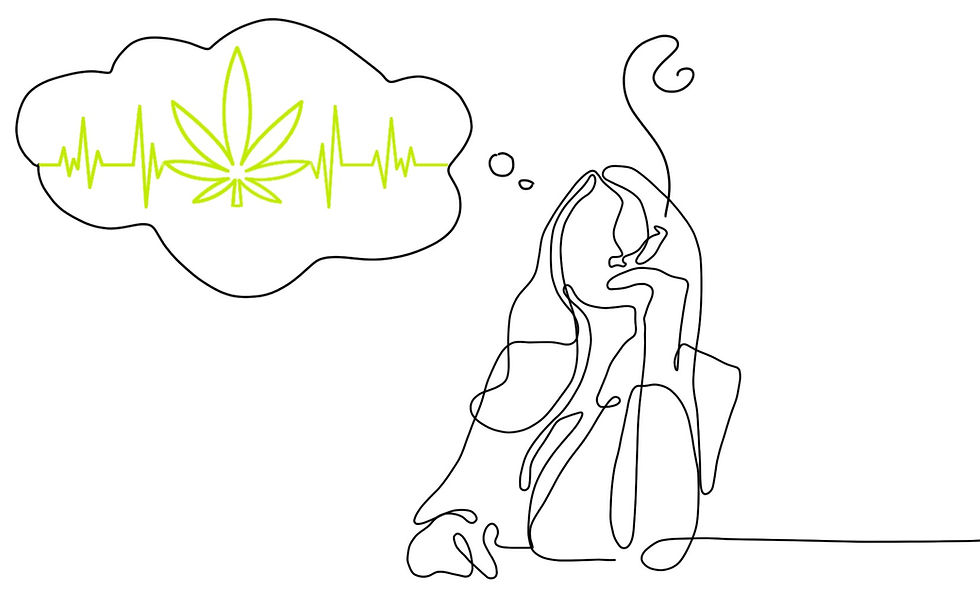Can Cannabis and CBD Help Treat PTSD?
- Olin Schumacher

- Aug 1, 2022
- 3 min read
Updated: Jan 26, 2023

Post Traumatic Stress Disorder (PTSD) is a psychiatric disorder that can occur in people who have experienced a traumatic event. Events such as natural disasters, war, accidents, death, violence, or serious injury can make a lasting and negative imprint in the psyche, provoking a long term sensitization and fight or flight response. There is a spectrum of severity in PTSD ranging anywhere from Wartime Trauma, to major life changes and can have an accumulative effect over time with multiple events.
The greatest indicator for PTSD is Acute Stress Disorder (ASD) following a traumatic event. Acute Stress Disorder can occur anywhere from three days to a month after a stressful event and is the precursor to the chronic long term symptoms of PTSD. About half of the people diagnosed with Acute Stress Disorder develop PTSD. It is important to recognize the universal signs of trauma in yourself and loved ones so that it can be treated sooner before it develops further. Cognitive behavior therapy can help control symptoms in this way. The most common prescription for Acute Stress Disorder and PTSD is Selective Serotonin Reuptake Inhibitor Antidepressants. SSRI medications have a lot of side effects and dangers that are not entirely understood. Evidence of increased self harm and suicide in young adults, stunted development in young people, negative effect on sleep, and long term damage to the body have been found. It is therefore paramount that a less damaging long term solution be implemented to both prevent and treat the debilitating effects of trauma.
People who experience PTSD or ASD often experience intense and disturbing thoughts and feelings relating to their experience long after the event. Patients often report reliving the event through flashbacks or dreams that provoke fear, anger, and sadness. Triggers such as loud noises, symbols or touch associated with the event often evokes a flight or fight response from victims of PTSD.
Because trauma has a direct effect on the homeostasis (balance) of the body, there are many other conditions that can arise as a result of PTSD. Adjustment Disorder often develops as a response to trauma. The symptoms of which include feeling tense, hopeless, withdrawn and showing impulsive behavior. Physical manifestations can also manifest including headaches, tremors, or heart palpitations. A clear sign that the body is out of balance.
The treatment for PTSD involves a neurological reprogramming to break the cyclic associations and response to the traumatic event. This involves re visiting the memories associated with the event in a relaxed setting with a professional. The most effective treatments often include drugs that aid the patient in observing and understanding their past in a new way. For many decades dedicated phycologists and phyconauts have fought for lenient legislation allowing substances like psilocybin, MDMA, and THC in psychiatric treatment.

Traditionally Cannabis has been used worldwide as treatment for a wide range of ailments including trauma. Despite the ongoing dispute over THCs effectiveness of PTSD, many states here in the united states now offer medical cannabis as a prescription for PTSD patients who advocate for its effectiveness. As Cannabis becomes more widely accepted and and readily available for personal use, a medical card will no longer be needed to self diagnose and treat trauma disorders.
Research is only now starting to uncover the biological mechanisms behind Cannabinoids, Terpines, Flavanoids and other compounds that create the therapeutic effect found in cannabis. Several new studies suggest that cannabis can reduce the activity of the amygdala, the portion of the brain associated with fear and "fight or flight". Further studies suggest that cannabis can help extinguish traumatic memories and encourages new neurological pathways to form. In this way THC and CBD have the potential to reduce anxiety and even prevent heightened anxiety responses in PTSD patients.
Cannabidiol (CBD) is becoming incredibly popular as a preventative measure against many disorders as a general tonic for maintaining homeostasis. Its Anti-inflammatory, antioxidant and neurodegenerative effects are well studied and give great insight into how the endocannabinoid system regulates our response to stress. This includes maintaining healthy sleep, body weight, stress levels, and immune response. If the bodies natural cannabinoids cannot contain the balance of the body than homeostasis is lost. In the case of PTSD the body is under such stress that the effects become severe. It is with the help of cannabinoids found in cannabis that homeostasis may again be achieved and relief felt.
Read more about how the endocannabinoid system works in our other blog.

.png)








Comments